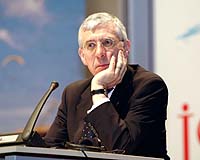 |
Washington (AFP) Feb 3, 2011 The US ambassador to Iraq assured lawmakers Thursday that the American diplomatic mission there will remain well protected even after the withdrawal of US troops in late 2011. A private security force some 5,500 strong will remain to protect the large US diplomatic presence, US Ambassador James Jeffrey told members of the Senate Armed Services Committee. Jeffrey and General Lloyd Austin, the commander of US military forces in Iraq, both said they were confident that the force was adequate, and that Iraq will remain stable once US troops have departed. "We face a critical moment now in Iraq, where we'll either ... finish the job and build upon the sacrifices made, or we will risk core US national security interests," Jeffrey told the senators. He described it as "a historic opportunity and a critical window to help Iraq emerge as a strategic partner and a force for stability and moderation in a troubled region." Starting in 2012, the US presence in Iraq will consist of up to 20,000 civilians at sites that include two embassy branches, two consulates, and three police training centers. The figures includes armed private security personnel, support staff and diplomats. Currently there are 2,700 armed security contractors in Iraq, Jeffrey told the senators. Austin said that US military advisers and trainers will stay to support the Iraqi military with US-made equipment such as M1A1 tanks, military aircraft and patrol ships. He did not give a figure, but said they would not include combat troops. Both Austin and Jeffrey said they were confident that Iraq's military and police could maintain order once the US troops exit. The Iraqi security forces "have a good capability" to confront Shiite extremist groups and Al-Qaeda in Iraq, Austin said. Austin and Jeffrey also said they had no indication that the Iraqis want the US military to remain beyond 2012. Republican Senator John McCain said that he was "very concerned" about the activities of radical Shiite cleric Moqtada al-Sadr and his close ties with Iran. Sadr came to Iraq in early January after four years of self-imposed exile in Iran, but stayed for only two weeks and returned to Iran, officials with his group said in Iraq. The fiery Sadr gained widespread popularity among Shiites in the months after the 2003 US-led invasion, and his Mahdi Army militia battled US and Iraqi government forces in several bloody confrontations. But in August 2008, Sadr suspended the activities of the Mahdi Army after major US and Iraqi assaults on its strongholds in Baghdad and southern Iraq in the spring. Just 50,000 US troops remain in Iraq, down from a peak of more than 170,000 and ahead of the full withdrawal in late 2011.
Share This Article With Planet Earth
Related Links Iraq: The first technology war of the 21st century
 Former British FM Straw to bring Iraq hearings to a close
Former British FM Straw to bring Iraq hearings to a closeLondon (AFP) Feb 2, 2011 Former foreign minister Jack Straw was Wednesday to give evidence to Britain's Iraq war inquiry for the third time as the panel prepared to hold its final public hearing. Straw, who was foreign minister when Britain decided to join the US-led invasion of Iraq in 2003, was expected to be quizzed over the legal basis for the intervention. At previous hearings, Straw said that his decision ... read more |
|
| The content herein, unless otherwise known to be public domain, are Copyright 1995-2010 - SpaceDaily. AFP and UPI Wire Stories are copyright Agence France-Presse and United Press International. ESA Portal Reports are copyright European Space Agency. All NASA sourced material is public domain. Additional copyrights may apply in whole or part to other bona fide parties. Advertising does not imply endorsement,agreement or approval of any opinions, statements or information provided by SpaceDaily on any Web page published or hosted by SpaceDaily. Privacy Statement |